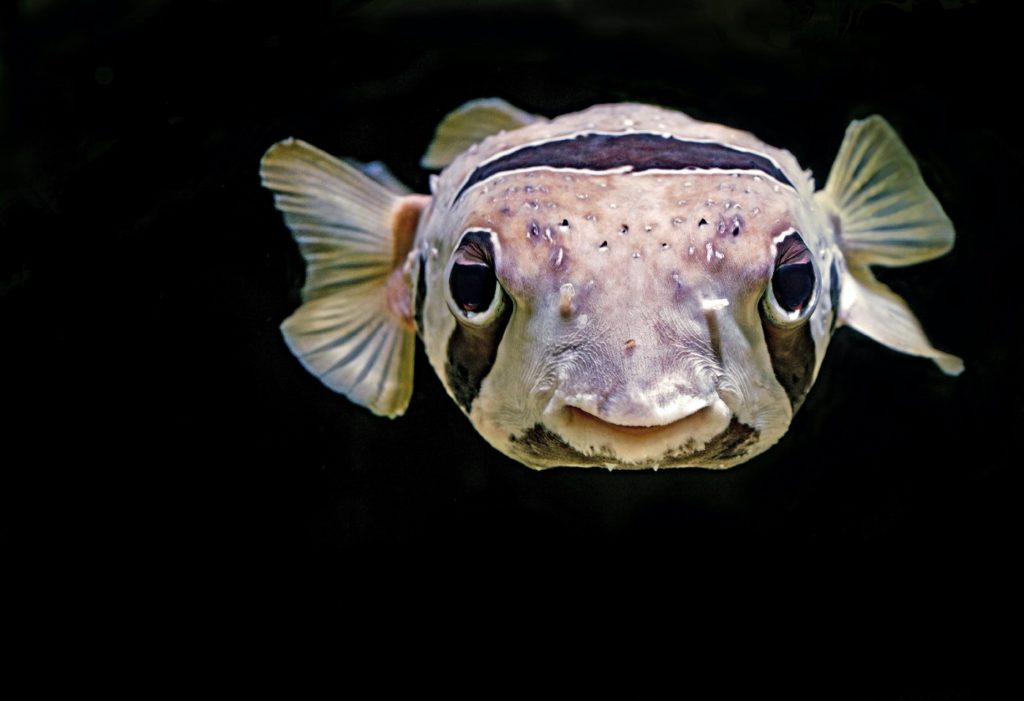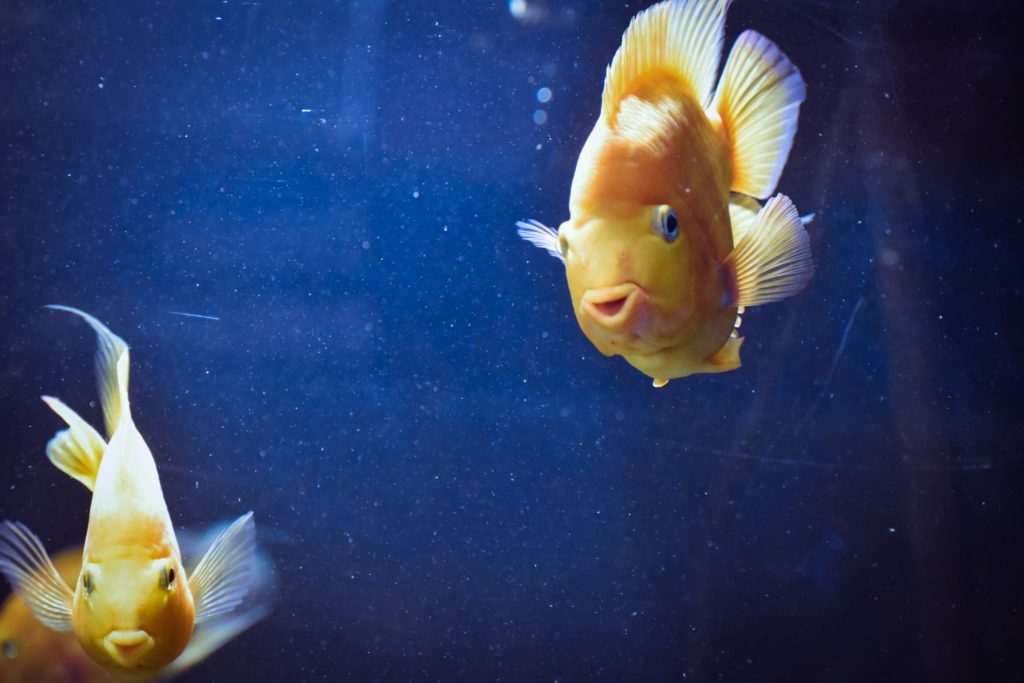
I first became interested in advocating for fish when I saw a plump, wide-eyed porcupinefish staring up at me from the cover of What a Fish Knows. Before Jonathan Balcombe’s book, I had seldom thought of a fish as adorable like a pig, turkey, or dolphin—animals I’d advocated for more often. Flipping through the pages, I was awestruck by the tremendous fish diversity. I learned about the fish sentience debate—and why it’s likely our finned friends feel no shortage of pain and pleasure.
A number of biases make people less likely to care about fishes. Consequently, labels for fish meat rarely even try to convince us of their humane treatment. Wild catches lack welfare standards, and methods for slaughtering farmed fish lag behind. We make them suffocate for over an hour, bleed to death without a stun, or suffer in an ice or toxic bath.
What A Fish Knows also contains heartwarming stories of human-fish connection, like that between Deborah Lindquist and her adopted Red Devil Cichlid named Francine, who loved swimming up for kisses. Francine would splash loudly if Deborah forgot to pay attention to her, and she’d come back to life after they returned from a trip.
Here are 6 reasons we forget that each fish, like Francine, is a sentient being who deserves our empathy.
1. Aquatic animals’ bite-sized underwater lives are more of a secret
I grew up seeing land animals everywhere. Fish, on the other hand, were like aliens who lived in “water space.” I only observed their lives when they’d been downsized to a tank in the corner of a room. Some fish are quite small, and it’s easy to think big animals are the more important.
2. Fish communication and their senses differ from ours
Unblinking, fishes don’t breathe air or use face expressions. Their inability to scream makes their struggle against a net seem benign. But as I got from What a Fish Knows, there are little-known ways fish communicate.
Sound waves are 5x longer and faster in water. This means humans require special technology to hear underwater sounds, which fish hear perfectly. One way to vocalize underwater is by vibrating an organ called a swim bladder. Fishes may also grind their jaw or throat teeth, rub their gills or bones, and even make sounds through their anuses. National Geographic reported on how herrings use high-pitched farts to communicate at night without alerting most prey.
The “facial fingerprints” of a damselfish show up only in UV light, which they can see. Electric pulses enable an African elephantfish to convey age, sex, location, size, and libido. Catfish have taste buds all over their bodies, and a male sheepshead swordtail goes upstream and pees so their scent will reach a female.
Fishes clearly live in a rich world of sensation. Some fish, like cleaner wrasse, are so socially complex they’re one of the few animals to pass the mirror test, a sign of self-awareness.
3. Our brain evolution split off from fishes long ago
It’s easiest to argue that fellow mammals, with a neocortex, are conscious. Yet, corvid birds such as ravens are among the most cognitively advanced animals, despite having a paleocortex, and they also disprove the brain size bias. Could it be that a fish’s pallium evolved on a separate path but makes them feel intensely too?
Studies of how fish interact with noxious stimuli, with painkillers, and their brain activity have convinced many thinkers and institutions to recognize them as sentient. The American Veterinary Medical Association, for example, gives guidelines for vets who have to euthanize, saying fish “should be accorded the same considerations as terrestrial vertebrates in regard to relief from pain.”
4. The huge numbers of fish make it inconvenient to care
Consider Veganism has compiled data on the animals people kill for food:
- Donkeys butchered in 2013: over 2.5 million.
- Chickens slaughtered for meat that year: 61 billion.
- Fishes we kill from the wild each year: 1 to 2.7 trillion.
As we know from the identifiable victim effect, a million deaths feels like a statistic, not a tragedy. We can counter this by thinking of just one fish, whom we would like to give mercy.
5. No-fish diet restrictions are not as common
Meat may refer to flesh from a mammal or land animal only. Almost as if fishes were floating fruits! Pescatarianism gives the impression fish do not suffer as much. By contrast, it is rare to meet someone whose ethics allow them to eat any meat but fish.
Yet, there are plausible reasons to quit fish first. As we have just considered, smaller beings get hurt in greater numbers for our meals. Fish are factory-farmed or fished in a process that drags out the agony, in a way that is arguably worse than in a slaughterhouse. Other concerns specific to eating water animals are mercury levels, bycatch, and overfishing.
6. Fishing is seen as a peaceful hobby compared to hunting
I could fish while relaxing on a boat. The sun shimmers over my shoulders, dancing on the still water when suddenly I feel a tug… No need to sneak around with a loud, dangerous gun. But what difference does it make for the victim, whether we call their demise “hunting” or “fishing?”
The catch-and-release tradition makes it seem as if a fish doesn’t mind having a painful hole put in their mouth. With wild animals of the forest or meadow, we might be more opposed to the idea of deliberating injuring them for entertainment.

Let’s be better friends to the finned
These 6 biases against fish beg the question of whether we downplay other animals too. Much has been written about the debates surrounding reptiles and invertebrates. Science is increasingly supporting that fish and other “less popular” animals are sentient and can suffer. Here are a few ideas for how we could help fishes:
- Try ready-made fish alternatives for tuna, fish sticks, caviar, and more.
- Cook your own Thai Style Vegan Fish Cakes with this recipe from Hannah Roberts.
- Include vegan sources of omega-3 fatty acids like flax, chia, hemp, walnuts, Brussels sprouts, or an algal supplement.
- Don’t go fish for entertainment. Unless we’re talking about the card game! (Also, play a less boring card game.)
- Be involved with the success of cell-cultured seafood. Companies like Finless Foods and Avant Meats are coming out with fish meat grown from cells, slaughter-free.
- Adopt a goldfish, rather than fund the pet industry.
- Support campaigns and petitions on behalf of fish, as well as environmental efforts to protect their rivers and oceans.
Thank you for caring about fishes! I wish you all a “fin”-tastic day.
Get more like this—Sign up for our daily inspirational newsletter for exclusive content!
__
Photo: David Clode, Aman Mahapatra via Unsplash




